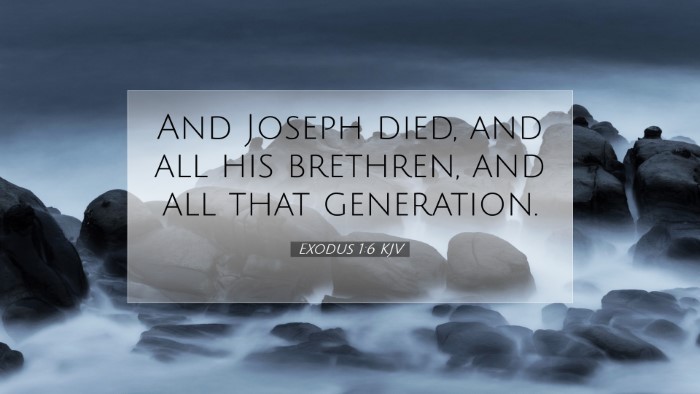Commentary on Exodus 1:6
Introduction: Exodus 1:6 states, "And Joseph died, and all his brethren, and all that generation." This verse serves as a pivotal moment that marks the transition from favor in Egypt to oppression for the people of Israel. Various public domain commentaries provide insights into the significance of this verse in the larger narrative of Exodus.
Contextual Analysis
Historical Background: The death of Joseph and his brothers signifies the end of an era in Egypt. Joseph, who had risen to power and secured favor for his family, represents a point of blessing that the Israelites experienced. The transition that follows calls attention to the faithfulness of God, juxtaposed against human frailty.
Matthew Henry's Commentary: Henry emphasizes that the death of Joseph was not merely a natural occurrence; it was a divinely significant event. He points out the importance of Joseph's role in preserving the lineage of Israel, suggesting that God's providential hand was evident in Joseph's life, but the transition indicates the sovereignty of God's plan in shaping the destiny of Israel. The demise of that generation sets the stage for the fulfillment of God's promises through trials and deliverance.
Albert Barnes' Observations: Barnes discusses the implications of the death of Joseph and his brethren in the broader narrative of Israel's history. He notes that Joseph’s death illustrates the common fate of all mankind and reminds us that even great leaders must face mortality. This introduces the theme of God’s continuity despite human mortality and prepares the reader for the hardships that await Israel, framing them not merely as consequences of human actions but as opportunities for divine intervention.
Adam Clarke's Insights: Clarke provides an extensive reflection on the generational shift following Joseph's death. He notes that the new generation may not have recognized the contributions of Joseph, leading to a gradual decline in favor for the Israelites in Egypt. This observation highlights the danger of forgetting God's past deliverances and the faithfulness he showed to ancestors, stressing the importance of remembering and teaching these events to successive generations. Clarke also warns of complacency and the need for spiritual vigilance among God's people.
Theological Implications
The Sovereignty of God: The passage illustrates that God’s sovereignty is overarching. Even when circumstances seem unfavorable, it is crucial to trust in God's larger plan. This transition demonstrates that God often uses adverse situations to bring about greater deliverance and salvation.
The Nature of Humanity: The mortality of Joseph and his brethren serves as a reminder of the human condition—finite and reliant on God's grace. Leaders and their legacy may fade, but God's covenant with His people remains steadfast.
Lessons for Modern Readers
- The Importance of Remembrance: Just as Clarke notes the danger of forgetting, modern believers are encouraged to remember and teach the faithfulness of God across generations.
- Trusting in God’s Plan: Assuring ourselves that God’s providential plan continues through all circumstances encourages faith amidst trials.
- The Transience of Life: Life is fleeting, and earthly power ultimately gives way. Therefore, believers are called to invest in eternal values rather than temporary ones.
Conclusion
Exodus 1:6 is a concise yet profound verse that encapsulates the transition from a favored status in Egypt to the imminent oppression. The collective insights from Henry, Barnes, and Clarke emphasize the importance of understanding this moment not just historically but theologically. For pastors, students, theologians, and scholars, this verse serves as a reminder of God’s sovereignty, the importance of spiritual memory, and teaches the necessity of dependence upon God's overarching purpose even in difficult times. Each reflection on this verse calls for a deeper contemplation of God’s faithfulness and the human responsibility to pass on the stories of His deliverance to the next generation.


